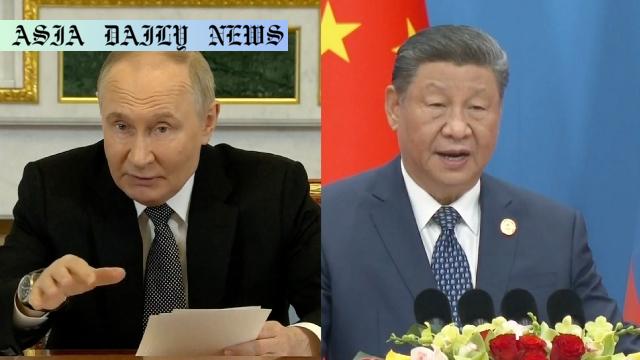Israel-Iran Conflict discussed as Putin and Xi Jinping condemn Israel’s actions, urging global restraint in resolving tensions.
- Putin and Xi discuss the Israel-Iran conflict, condemning Israeli actions.
- Both leaders call for restraint and reject force as a resolution method.
- They urge global powers, especially the US, to de-escalate tensions.
- Agreed collaboration between Russia and China in relevant agencies for insights.

Introduction: Analyzing the Israel-Iran Conflict
The recent telephone discussion between Russian President Vladimir Putin and Chinese President Xi Jinping highlights a significant geopolitical moment amidst escalating tensions between Israel and Iran. The dialogue unequivocally condemned Israeli actions, framed as violations of the UN Charter, and emphasized the necessity for restraint and diplomacy. This interaction underscores the broader implications of global powers weighing in on complex, multifaceted conflicts that ripple across international frameworks.
Condemning Israel’s Actions
Russian presidential aide Yury Ushakov revealed that both leaders firmly condemned Israeli operations, presenting their stance as a matter of principle rather than politics. Their opposition to the use of force aligns with broader critiques aimed at interventions such as those proposed by the United States under its current administration. Condemnation of Israel’s strategies also draws attention to what they perceive as critical breaches of international law and established norms. By choosing to highlight Israel’s conduct, both Putin and Xi signal their willingness to engage diplomatically in global affairs while advocating a de-escalation of violence.
The Call for Restraint and Diplomacy
In contrast to escalating rhetoric from certain Western powers, notably the United States under President Donald Trump, Xi Jinping proposed a perspective of calm and dialogue. In remarks shared via China’s foreign ministry, he stressed the role of influential global players in resolving the situation. This appeal for restraint serves as a stark contrast to more militarized approaches that have been suggested, positioning Moscow and Beijing as advocates for pragmatic, non-violent resolutions. Moreover, it places the emphasis back on international cooperation and multilateralism in addressing complex issues like the Iran-Israel rivalry and broader Middle Eastern strife.
Russia and China Cement Collaboration
Another notable element of Putin and Xi’s conversation includes their agreement to deepen cooperation between their countries through their respective agencies and services. Their commitment extends beyond rhetoric, embracing concrete steps to share insights and perspectives related to the ongoing crisis. This concerted effort projects an image of unity and proactivity, creating avenues for informed discussions. It remains to be seen how these collaborations will materialize, yet such coordination demonstrates an alternative model for international engagement.
Global Implications: A New Approach?
The ramifications of this discussion stretch far beyond the immediate crisis. Their principled stance against using force to resolve the Iranian nuclear issue and adjacent disputes challenges the conventional reliance on military interventionism. Xi Jinping and Vladimir Putin, through their statements and actions, present a diplomatic roadmap that leans heavily on dialogue and shared global responsibility. For an international audience yearning for stability, the potential emergence of a Russo-Chinese axis as a force against unnecessary militarization might present an intriguing development, but one that comes with its own questions and responsibilities.
Overall, this dialogue showcases the ability of global powers to navigate heated geopolitical waters with the promise of calm reasoning. This alignment between Russia and China may, in time, serve as a benchmark for brokering peace and fostering constructive engagement in crisis-ridden regions worldwide.



Commentary
Introduction: Context of the Israel-Iran Conflict
The discussion between Vladimir Putin and Xi Jinping regarding the Israel-Iran conflict marks a notable instance of strategic alignment between two of the world’s most powerful leaders. Both Russia and China, with their profound geopolitical influence, have taken a clear stance against Israel’s actions, shedding light on their shared commitment to international law and diplomatic solutions. Beyond the immediate context, this partnership raises important discussions about the shifting dynamics within global power structures and diplomacy.
Strategic Implications of Condemnation
By taking a public stance condemning Israel, Putin and Xi have sent a resolute message to the global community. Their emphasis on restraint, rather than force, is not only a critique of the perceived American penchant for military interventions but also a calculated move to position themselves as advocates of stability. Their decision to address the Iranian nuclear program within this context is particularly telling, as it underscores their commitment to a broader view of Middle Eastern diplomacy that transcends isolated issues.
The Russo-Chinese Partnership in Focus
The decision by Putin and Xi to deepen collaboration between their nations highlights the increasingly important role of their partnership in international affairs. While Western nations often dominate the conversation around Middle Eastern conflicts, this discussion signals an opportunity for alternative power centers to emerge. It also serves as a testament to their mutual belief in coordinated, multilateral action over unilateral, force-driven solutions.
Conclusion: A Broader Perspective
As the geopolitical landscape continues to evolve, this dialogue between Russia and China presents both questions and opportunities. Their stance advocates a global system where diplomacy takes precedence, urging influential nations to prioritize de-escalation over provocation. The success of this strategy will undoubtedly depend on how effectively they can translate these ideas into actionable policy. For now, their message offers a glimmer of hope for those seeking peaceful resolutions in an increasingly fragmented world.